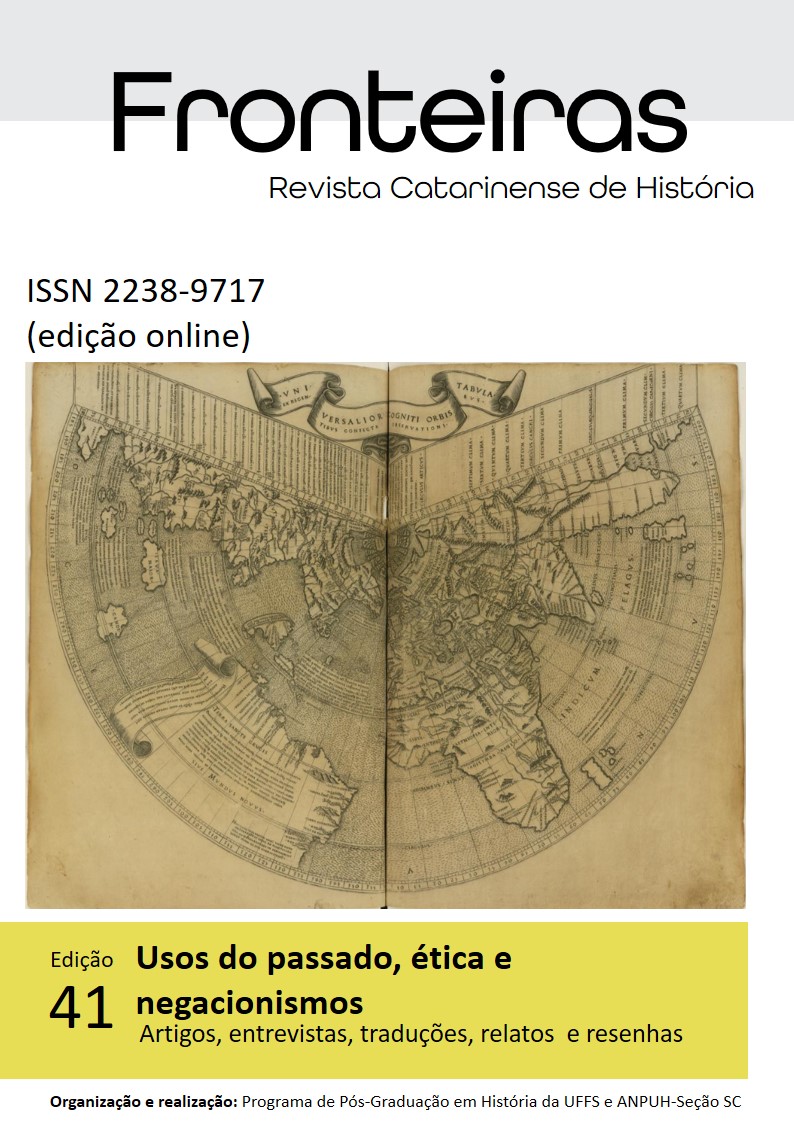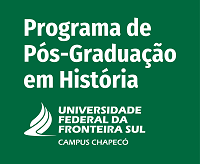The question of truth in post-Shoah historiography
denialism, revisionism and narrativism
DOI:
https://doi.org/10.36661/2238-9717.2023n41.13150Keywords:
Shoah, Truth, Denialism, Revisionism, NarrativismAbstract
The debate around the question of truth is, inevitably, present whenever the historiographical account is discussed. Changes in relation to the categories and notions that guide this debate were considered over time. In this article, I highlight the period subsequent to the Second World War as a moment of crisis in historiography and a moment in which history opened up to the processes of memory, especially testimony. The concepts and discussions that accompanied the Shoah's denialism and revisionism will be mobilized to present the dispute that accompanied Hayden White's so-called narrativism as an indication of an alternative sought by contemporary historiographical work.
Downloads
References
ANDERSON, Perry. On Emplotment: Two Kinds Of Ruin. In: FRIEDLÄNDER, Saul (Org). Probing the Limits of Representation: Nazism and the “Final Solution”. Cambridge; Massachusetts: Harvard University, 1992. p. 54-65.
ARENDT, Hannah. The Aftermath of Nazi Rule. Commentary, 10 October 1950. Disponível em: https://www.commentary.org/articles/hannah-arendt/the-aftermath-of-nazi-rulereport-from-germany/. Acesso em: 20 set. 2022.
ÁVILA, Arthur. Qual passado escolher? Uma discussão sobre o negacionismo histórico e o pluralismo historiográfico. Revista Brasileira de História, v. 41, n. 87, 2021, p. 161-184.
BARDÈCHE, Maurice. Nuremberg ou la Terre promisse. Paris: Les Sept Couleurs, 1948.
BARTOV, Omer. Murder in our Midst. The Holocaust, Industrial Killing and Representation. New York: Oxford University Press, 1996.
BEHRENS, Paul; TERRY, Nicholas; JENSEN, Olaf. Holocaust and Genocide Denial. A Contextual Perspective. New York: Routledge, 2017.
BEORN, Waitman Wade. Marching into Darkness: the Wehrmacht and the Holocaust in Belarus. Cambridge: Harvard University Press, 2014.
CUESTA BUSTILLO, Josefina. La memoria del horror, después de la II Guerra Mundial. Memoria e historia, n. 32, 1998, p. 81-104.
DAWIDOWICZ, Lucy. The War Against the Jews 1933-1945. New York: Penguin Books, 1975.
DES PRES, Terrence. The Survivor. An Anatomy Of Life In The Death Camps. New York: Oxford University Press, 1976.
EVANS, Richard. In Hitler’s Shadow: West German Historians and the attempt to escape from the Nazi past. New York: Pantheon Books, 1989.
FAURISSON, Robert. Écrits Révisionnistes (1974-1998). Edition privée hors-commerce, 1999.
FRIEDLÄNDER, Saul. A Conflict of Memories? The New German Debates about the “Final Solution”. New York: Leo Baeck Institute, 1987.
GINZBURG, Carlo. Just One Witness. In: FRIEDLÄNDER, Saul (Org.). Probing the Limits of Representation: Nazism and the “Final Solution”. Cambridge: Harvard University, 1992.
GINZBURG, Carlo. Relações de força: história, retórica, prova. São Paulo: Companhia das Letras, 2002.
HABERMAS, Jürgen. Eine Art Schadensabwicklung: Die apologetischen Tendenzen in der deutschen Zeitgeschichtsschreibung. Die Zeit, n. 29, 11 Juli 1986.
HARTOG, François. Evidência da História. O que os historiadores veem. Tradução de Guilherme João de Freitas Teixeira. Belo Horizonte: Autêntica, 2011.
HEER, Hannes. Killing Fields: The Wehrmacht and the Holocaust in Belorussia, 1941-1942. Holocaust and Genocide Studies, v.11 n. l, 1997, p. 79-101.
HILBERG, Raul. Perpetrators, Victims, Bystanders: The Jewish Catastrophe 1933-1945. New York: Aaron Asher Books, 1992.
HILLGRUBER, Andreas. No Questions are Forbidden To Research. In: PIPER, Ernst. Forever In The Shadow Of Hitler? Original Documents Of the Historikerstreit, The Controversy Concerning The Singularity Of The Holocaust. Atlantic Highlands: NJ Humanities Press, 1993.
HILLGRUBER, Andreas. Zweierlei Untergang: die Zerschlagung des Deutschen Reiches und das Ende des europäischen Judentums. Berlin: W.J. Siedler, 1986.
HIXENBAUGH, Mike; HYLTON, Antonia. Southlake school leader tells teachers to balance Holocaust books with “opposing” views, NBC News, New York, 14 oct 2021. Disponível em: https://www.nbcnews.com/news/us-news/southlake-texas-holocaust-books-schools-rcna2965. Acesso em: 14 ago 2022.
HUTTENBACH, Henry R. Mandating State Security: Keeping the Holocaust Hidden. Journal of Genocide Research, v. 5, n. 2, 2003, p. 309-311.
IADONISI, Rick. Bleeding History and Owning His [Father’s] Story: Maus and Collaborative Autobiography. CEA Critic, v. 57, n. 1, 1994, p. 41-56.
JENKINS, Keith. A História repensada. Tradução de Mario Vilela. São Paulo: Contexto, 2011.
LACAPRA, Dominick. History and Memory after Auschwitz. Ithaca: Cornell University Press, 1998.
LEVI, Primo. É isto um homem? Tradução de Luigi Del Re. Rio de Janeiro: Rocco, 1988.
LEVI, Primo. Os afogados e os sobreviventes. Tradução de Luiz Sérgio Henriques. Rio de Janeiro: Editora Paz e Terra, 2016.
LÉVY, Bernard-Henri. O espírito do judaísmo. Tradução de Bernardo Ajzenberg. São Paulo: Três Estrelas, 2018.
LIPSTADT, Deborah. History on Trial. My day in Court with David Irving. New York: Harper Collins Publishers, 2005.
LIPSTADT, Deborah. The Eichmann Trial. New York: Jewish Encounters, 2011.
LORENZ, Chris. Scientific Historiography. In: TUCKER, Aviezer. A Companion to the Philosophy of History and Historiography. Chichester: Blackwell Publishing, 2009.
LYOTARD, Jean-François. A condição pós-moderna. Tradução de Ricardo Corrêa Barbosa. Rio de Janeiro: Editora José Olympio, 2009.
MOSES, A. Dirk. Hayden White, Traumatic Nationalism, and the Public Role of History. History and Theory, n. 44, 2005, p. 311-332.
NOLTE, Ernst. Vergangenheit, die nicht vergehen will. Frankfurter Allgemeine Zeitung, 6. Juni 1986.
PAUL, Herman. Hayden White: The Historical Imagination. Cambridge: Polity Press, 2011.
POMIAN, Krzysztof. História e Ficção. Tradução de Marina Maluf. Proj. História. São Paulo, 26, 2003.
RANKE, Leopold von. Geschichten der romanischen und germanischen Völker von 1494 bis 1514: Zur Kritik neuerer Geschichtsschreiber. Leipzig: Sämmtliche Werke, 1874.
ROUDINESCO, Elisabeth. Retorno à questão judaica. Tradução de Claudia Berliner. Rio de Janeiro: Zahar, 2010.
ROUSSO, Henry. Le syndrome de Vichy, de 1944 à nos jours. Paris: Points Seuil, 1987.
SANTNER, Eric. L. History beyond the Pleasure Principle: Some Thoughts on the Representation of Trauma. In: FRIEDLÄNDER, Saul (Ed). Probing the Limits of Representation: Nazism and the “Final Solution”. Massachusetts: Harvard University Press, 1992. p. 143-154.
SCHOLTZ, Gunter. O problema do historicismo e as ciências do espírito no século XX. História da Historiografia: International Journal of Theory and History of Historiography, Ouro Preto, v. 4, n. 6, 2011, p. 42-63.
SHERMER, Michael; GROBMAN, Alex. Who says the Holocaust never happened and why do they say it? Berkeley: University of California Press, 2009.
SPIEGELMAN, Art. A Problem of Taxonomy. New York Times, New York, 29 dez. 1991. Disponível em: https://www.nytimes.com/1991/12/29/books/l-a-problem-of-taxonomy-37092.html. Acesso em: 13 out. 2021.
SPIEGELMAN, Art. Maus: a história de um sobrevivente. Tradução de Antonio de Macedo Soares. São Paulo: Companhia das Letras, 2009.
VIDAL-NAQUET, Pierre. Lettre. In: GIARD, Luce (Ed). Michel de Certeau. Paris: Centre Georges Pompidou, 1987, p. 71-74.
VIDAL-NAQUET, Pierre. Os assassinos da memória: “Um Eichmann de papel” e outros ensaios sobre o revisionismo. Tradução de Marina Appenzeller. São Paulo: Papirus, 1988.
WHITE, Hayden. Historical Emplotment and the Problem of Truth. In: FRIEDLÄNDER, Saul (Org.). Probing the Limits of Representation: Nazism and the “Final Solution”. Cambridge: Harvard University, 1992. p. 37-53.
WHITE, Hayden. The content of the form: narrative discourse and historical representation. Baltimore: The John Hopkins University Press, 1987.
WHITE, Hayden. The Modernist Event. In: SOBCHACK, Vivian. The persistence of history: cinema, television, and the modern event. New York: Routledge, 1996.
YITZHAK, Arad. Belzec, Sobibor, Treblinka: The Operation Reinhard Death Camps. Bloomington: Indiana University Press, 1987.



















